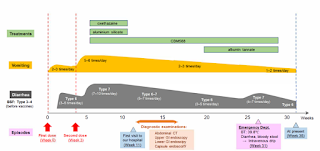Prolonged Diarrhea after COVID-19 vaccination
A 46-year-old woman with no notable medical history developed repeated vomiting approximately four hours after receiving the first BNT162b2 mRNA COVID-19 vaccine. Seven days after the first vaccination, she further developed 3–5 loose-to-liquid stools per day, which corresponded to type 6 on the Bristol Stool Form (BSF). Two weeks after the first vaccine dose, intermittent paraumbilical pain developed with associated loss of appetite. The patient decided to receive the second dose 21 days after the first dose, which furthered worsened her condition. Vomiting and diarrhea progressed, with 7–10 watery stools per day (BSF type 7). Blood tests performed 4 weeks after the second dose revealed normal levels of total and differential white blood cell (WBC) counts and serum C-reactive protein (CRP), slightly elevated D-dimer serum level (1.1 μg/mL), and slightly elevated serum C1 esterase inactivator activity. SARS-CoV-2 rapid antigen test was negative. Eight weeks after the second dose, the patient visited another hospital with prolonged abdominal pain, vomiting, and diarrhea. Throughout her clinical course, she did not have fever or extreme fatigue. She did not drink alcohol but had smoked 5–10 cigarettes per day from the age of 20 years. Upper GI endoscopy was performed 11 weeks after the second vaccine dose, which revealed only slight gastric erosion. Lower GI endoscopy performed 12 weeks after the second vaccine dose revealed diverticulosis and no signs of chronic inflammatory bowel disease (IBD). Stool culture of fecal samples obtained during endoscopy revealed the growth of normal microbial flora in the oral cavity. Pathologic evaluation of colonic mucosal biopsy stained with hematoxylin/eosin (H&E) revealed only a slight level of plasma cell infiltration.
The findings suggested a diagnosis of post-vaccine non-specific intestinal inflammation, and any kind of specific GI disease or malignancy was considered unlikely. To further investigate the condition of the small intestine mucosae, capsule endoscopy with PillCam SB3 (Medtronic, Minneapolis, USA) was performed 13 weeks after the second vaccine dose, which revealed no abnormal findings. At 28 weeks after the second vaccine dose the patient developed a fever of 39.8 ℃ along with diarrhea and bloody stools and visited the emergency department of another hospital. Abdominal CT was performed again with almost normal findings, and the patient was diagnosed with gastroenteritis and hemorrhoids. Thirty-two weeks after the second vaccine dose, the patient’s symptoms have not fully resolved yet, and she is being followed-up without medication.
REFERENCE
Akaishi T, Takahashi T, Sato S, Jin X, Masamune A, Ishii T. Prolonged Diarrhea Following COVID-19 Vaccination: A Case Report and Literature Review. The Tohoku Journal of Experimental Medicine. 2022.


Comments
Post a Comment